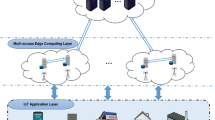Abstract
In this paper, a new prediction based dynamic scheduling mechanism is proposed to ensure quality of service especially in internet of things (IoT) by dynamically allocating bandwidth. The scheduling scheme is analyzed for two different applications: (1) to accommodate various streaming data of IoT applications or for medical applications. Traffic is segregated based on different traffic characteristics such as bit rate, packet loss rate and tolerable delay into different classes and they are prioritized based on these characteristics; and (2) to consider continuous long time data from all lightweight devices like sensors. The algorithm allocates bandwidth such that its utilization can be optimized for different applications. The scheduler decision is divided into two steps: (1) calculating average increase in queue length of high priority and medium priority services at current time slot from the previous time slot and, (2) adding these values to previous weight values for corresponding services and multiplying with a coefficient. The performance is carried out under different system loading and scenarios. The results illustrate the improvement of the advised scheduler with respect to end to end delay distributions, packet drop and end to end jitter values.







Similar content being viewed by others
References
Liang, J.-M., Chen, J.-J., Cheng, H.-H., & Tseng, Y.-C. (2013). An energy-efficient sleep scheduling with QoS consideration in 3GPP LTE advanced networks for internet of things. IEEE Journal on Emerging and Selected Topics in Circuits and Systems, 3(1), 13–22.
Awan, I., & Younas, M. (2013). Towards QoS in internet of things for delay sensitive information. In MobiWIS 2013 workshops, CCIS 183 (pp. 86–94), Springer International Publishing Switzerland.
Awan, I., Younas, M., & Naveed, W. (2014). Modelling QoS in IoT applications. In IEEE 17th international conference on network-based information systems (NBiS) (pp. 99–105).
Moosavi, S. R., Rahmani, A. M., Westerlund, T., Yang, G., Liljeberg, P., & Tenhunen, H. (2014). Pervasive health monitoring based on internet of things: Two case studies. In IEEE EIA 4th international conference on wireless mobile communication and healthcare (pp. 275–278).
Fok, C.-L., & Julien, C. (2011). Challenges of satisfying mulitple stakeholders:quality of service in the internet of things. In ACM Digital Library Proceedings of SESENA 2011 (pp. 55–60).
Klepec, B., & Kos, A. (2001). Performance of VoIP applications in a simple differentiated services network architecture. In IEEE international conference Eurocon 2001 (Vol. 1, pp. 214–217), Bratislava, Slovakia.
Sugeng, W., Istiyanto, J. E., Mustofa, K., & Ashari, A. (2015). The impact of QoS changes towards network performance. International Journal of Computer Networks and Communication Security., 3(2), 48–53.
Geng, X., Luo, A., Sun, Z., & Cheng, Yu. (2012). Markov chains based dynamic bandwidth allocation in diffserv network. IEEE Communication Letters, 16(10), 1711–1714.
Li, L., Li, S., & Zhao, S. (2014). QoS-aware scheduling of services-oriented internet of things. IEEE Transactions on Industrial Informatics, 10(2), 1497–1505.
Mashal, I., Alsaryrah, O., & Chung, T.-Y. (2016). Performance evaluation of recommendation algorithms on internet of things services. Physica A: Statistical Mechanics and Its Applications, 451, 646–656.
Diaz, M., Martin, C., & Rubio, B. (2016). State of the art, challenges, and open issues in the integration of Internet of things and cloud computing. Journal of Network and Computer applications, 67, 99–117.
Liu, L., & Xu, Z. (2005). Joint packet scheduling and channel allocation for wireless communications. In IEEE conference on signals, systems and computers (pp. 489–493).
Le, L. B., Hossain, E., & Alfa, A. S. (2006). Service differentiation in multirate wireless networks with weighted round robin scheduling and ARQ based error control. IEEE Transactions on Communications, 54(2), 208–215.
Cao, Y., & Li, V. (2002). Scheduling algorithms in broad-band wireless networks. Proceedings of the IEEE, 89(1), 76–87.
Abdullah, S., & Yang, K. (2013). A QoS aware message scheduling algorithm in internet of things environment. In IEEE online conference on green communications (pp. 175–180).
Fog, C.-L., Julien, C., Roman, G.-C., & Lu, C. (2011). Challenges of satisfying multiple stakeholders: Quality of service in the internet of things. In SESENA ACM, Waikiki, Honolulu, USA.
Monares, A., Ochoa, S. F., Santos, R., Orozco, J., & Meseguer, R. (2014). Modeling IoT-based solutions using human-centric wireless sensor networks. Sensors, 1424–8220, 15687–15713.
Wang, H., Shen, C., & Shin, K. G. (2004). Adaptive weighted packet scheduling for premium service. In IEEE communications, ICC (Vol. 6, pp. 1846–1850).
Sharma, R., Kumar, N., & Srinivas, T. (2014). Performance of new dynamic benefit-weighted scheduling scheme in diffserv networks. In Proceedings of IEEE international conference on advances in computing, communications and informatics, (ICACCI) (pp. 2578–2583), Noida
Goel, S., & Imielinski, T. (2001). Prediction based monitoring in sensor networks: Taking lessons from MPEG. ACM SIGCOMM Computer Communication Special Issue on Wireless Extensions to the Internet, 31(5), 82–98.
Author information
Authors and Affiliations
Corresponding author
Rights and permissions
About this article
Cite this article
Sharma, R., Kumar, N., Gowda, N.B. et al. Packet Scheduling Scheme to Guarantee QoS in Internet of Things. Wireless Pers Commun 100, 557–569 (2018). https://doi.org/10.1007/s11277-017-5218-8
Published:
Issue Date:
DOI: https://doi.org/10.1007/s11277-017-5218-8




